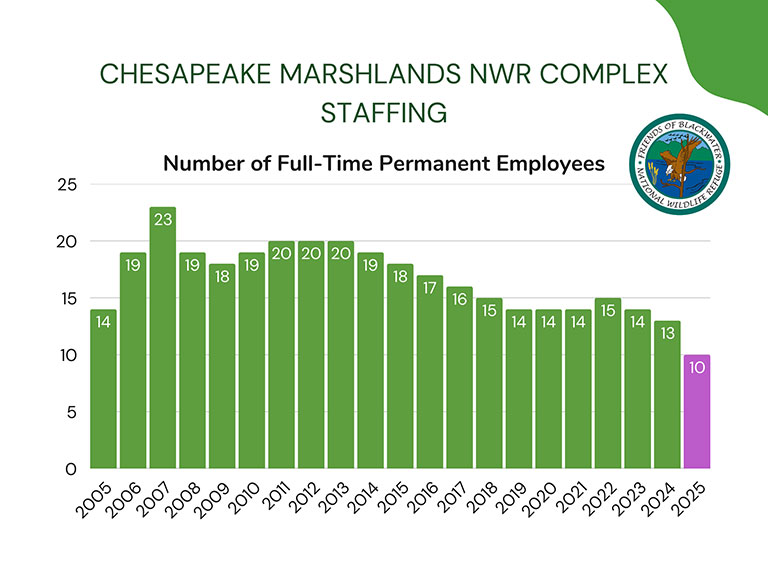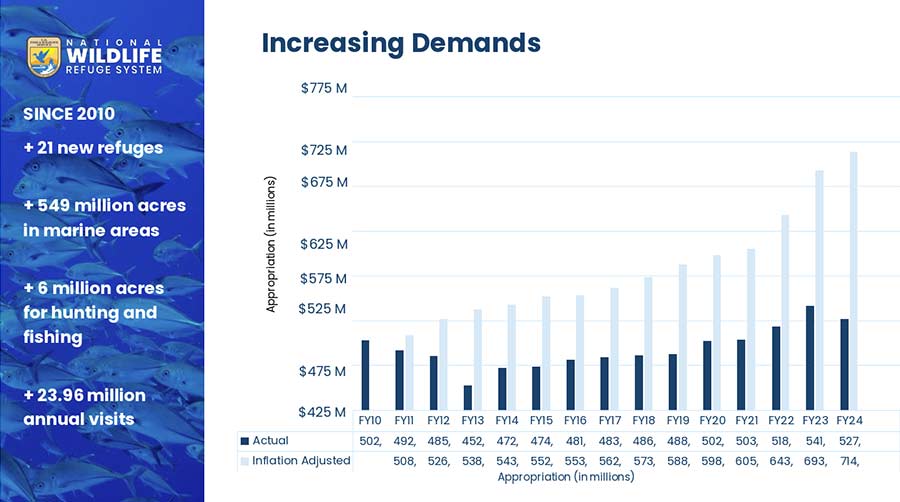Staff Cuts at Blackwater NWR
April 2, 2025 update: Blackwater NWR lost two probationary employees, but they were allowed to return for now via a court ruling. The Refuge also lost two additional employees who took the buyout offer. Future concerns include more reductions in staff, budget cuts, possible closing of refuges, and possible selling off of lands in the National Wildlife Refuge System.
Who are the Friends of Blackwater?
The Friends of Blackwater is a nonprofit citizens support group founded in 1987, assisting Blackwater National Wildlife Refuge (NWR) in Cambridge, Maryland, and the Chesapeake Marshlands National Wildlife Refuge Complex to carry out their educational, interpretive, and public use missions. The all-volunteer Friends of Blackwater provide fundraising, volunteer labor, and advocacy to support the Refuge. The Friends run the Refuge gift store and Wild Goose Chase Women's Bicycle Ride (proceeds of both go to the Refuge), manage the popular wildlife cameras, do trail maintenance, support Refuge events like the popular Eagle Festival, help with the biological program, and a host of other activities. The Friends have witnessed firsthand how over the years budget and staffing cuts have weakened the U.S. Fish and Wildlife Service's ability to maintain healthy ecosystems, manage wildlife conservation effectively, and provide engaging visitor services at Blackwater NWR.
What is Blackwater NWR?
The Chesapeake Marshlands National Wildlife Refuge Complex is comprised of Blackwater, Eastern Neck, Martin, and Susquehanna National Wildlife Refuges (40,472 acres total). The complex is part of the National Wildlife Refuge System (different than the National Park System) and is managed by the U.S. Fish and Wildlife Service. Blackwater NWR was created in 1933 as a Refuge for migratory birds and attracts thousands of geese, ducks, swans, and other migratory winter birds. The Refuge also protects a myriad of other species including formerly endangered wildlife such as the Delmarva Fox Squirrel, the Peregrine Falcon, and the Bald Eagle. Blackwater NWR has been recognized for its excellence as a national wildlife refuge, winning all four major awards in the National Wildlife Refuge System - Manager of the Year, Employee of the Year, Volunteer of the Year, and Friends Group of the Year.
What is the economic impact of the Refuge?
Visitors come to Blackwater for the large waterfowl numbers, bald eagles, peaceful scenery and waterscapes, and recreational activities such as wildlife watching, photography, cycling, paddling, hunting, and fishing. Blackwater gets over 200,000 visitors a year with the majority coming from outside the region. The economic impact of the Refuge is over $5.8 million with 60% coming from out of town.
Blackwater NWR is also a mecca for hunting. Blackwater offers deer, waterfowl, and turkey hunting. Blackwater’s sika population makes the Refuge popular with hunters from all over the world. Approximately 30% of hunters are from out of state. Hunters use hotels, Airbnbs, buy meals and gas, support local businesses and more. A study by Morgan State and Maryland DNR found that sika hunters spend an estimated $8.7 million on trips, with Blackwater being the heart and draw for sika hunters everywhere. The 2024/2025 season was Blackwater’s highest harvest ever with 786 sika taken from over 2,100 individual hunters. Hunting helps reduce the herd, which benefits local forests, wildlife, neighboring landowners and farmers.
What has happened to the staff at Blackwater NWR?
In 2007 at the peak of staffing, the Refuge had 187,000 visitors and 25,686 acres compared to over 200,000 visitors and 33,000 acres in 2024. From a high of 23 staff, the Refuge complex is now down to only 11 staff members. All 11 are located at Blackwater NWR with no staff at the other complex Refuges - Eastern Neck, Martin and Susquehanna. The erosion of quality biological, visitor services, maintenance, and management staff in the Chesapeake Marshlands Complex is captured in the first chart below. The second chart shows how the budget for the National Wildlife Refuge System has not kept up with increasing demands and inflation.


Without adequate staff snd funding for national wildlife refuges, the negative impacts can include:
- biodiversity loss
- vulnerability to climate hazards
- decreased conservation partnerships
- increased invasive species
- illegal taking of wildlife
- aging infrastructure
- limited visitor services and recreational access
- risks to public safety
What does the U.S. Fish and Wildlife Service do at Blackwater NWR?
When staffing and budget cuts hit the U.S. Fish and Wildlife Service at Blackwater NWR, staff must compromise on the many things they do to support the habitat, the wildlife, and the visitors. Below is a list of just some of the staff's activities:
- Spray nearly 1000 acres of phragmites a year to protect salt marsh habitat and impoundment ponds from invasives (many birds cannot feed or nest in phragmites)
- Work to protect the ash trees along the Marshyhope and Nanticoke from the emerald ash borer
- Oversee 260 acres of forest thinning to release oaks and improve forest quality for wildlife; monitor logging, mark trees, prepare bids for local loggers to bid on, burn after logging to restore the ecosystem
- Manage Nanticoke unit for rare species of plants; plan forest thinning and prescribed fire to aid these species. Vegetation helps songbirds, quail, turkey, and pollinators
- Help run the environmental education program, which benefits 4th and 6th graders from all Dorchester County schools
- Maintain critical infrastructure that helps the public access and enjoy their public lands, including 47 parking lots (41 for hunting and 6 for general access) and 27 miles of hunt and access roads. Also maintain 16 miles of water trails and 5 miles of hiking trails
- Mow causeway and maintain two soft launches and two parking lot for anglers
- Manage the Blackwater volunteer program with over 140 volunteers at Blackwater who staff the Visitor Center, run the wildlife cameras, perform trail maintenance, help with the biological program, perform waterfowl surveys, and more [also manage the Eastern Neck volunteer program with 64 volunteers].
- Assist other agencies/organizations with research on sika, white-tailed deer, snakehead, and bats
- Work with partners to restore wetlands on and around the Refuge
- Host the popular annual Eagle Festival and Youth Fishing Derby. In 2024, the Eagle Festival brought in over 2,100 attendees
- Protect public and wildlife safety through law enforcement
And with over 75% of the wintering waterfowl on the Refuge using habitats intensively managed to meet their needs, other important activities include:
- Manage 450+ acres of impoundments and moist soil units that have been constructed with partners such as Ducks Unlimited to benefit and attract waterfowl
- Perform dike repair and maintenance of the impoundment dikes
- Manage water levels for native seed production in these impoundments, which benefit waterfowl
- Plant clover, winter wheat, and corn as food resources for wintering waterfowl
How you can help
There are a couple things you can do:
- Support the Friends of Blackwater by donating or joining. All proceeds go toward supporting Refuge projects and filling in budget gaps when possible
- Write the U.S. senators and congressman who serve the Blackwater NWR region. Urge them to support adequate funding and staffing at Blackwater NWR and reject cuts that will hurt the Chesapeake Marshlands National Wildlife Refuge Complex. Be sure to share your story about how you've enjoyed and used these Refuges:
